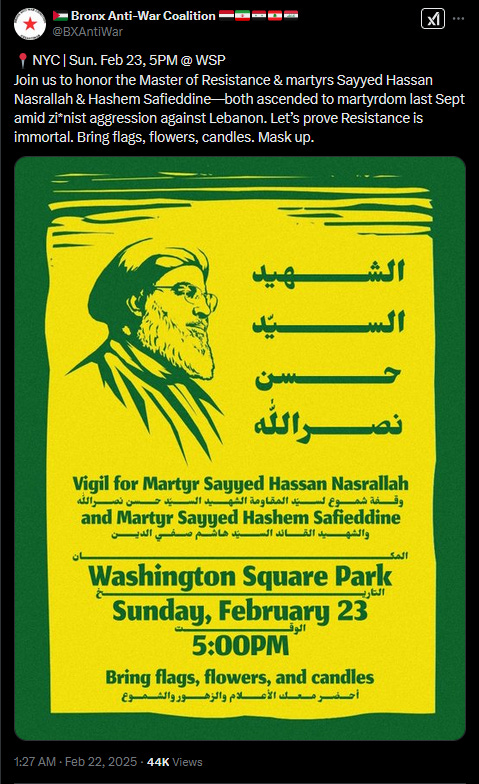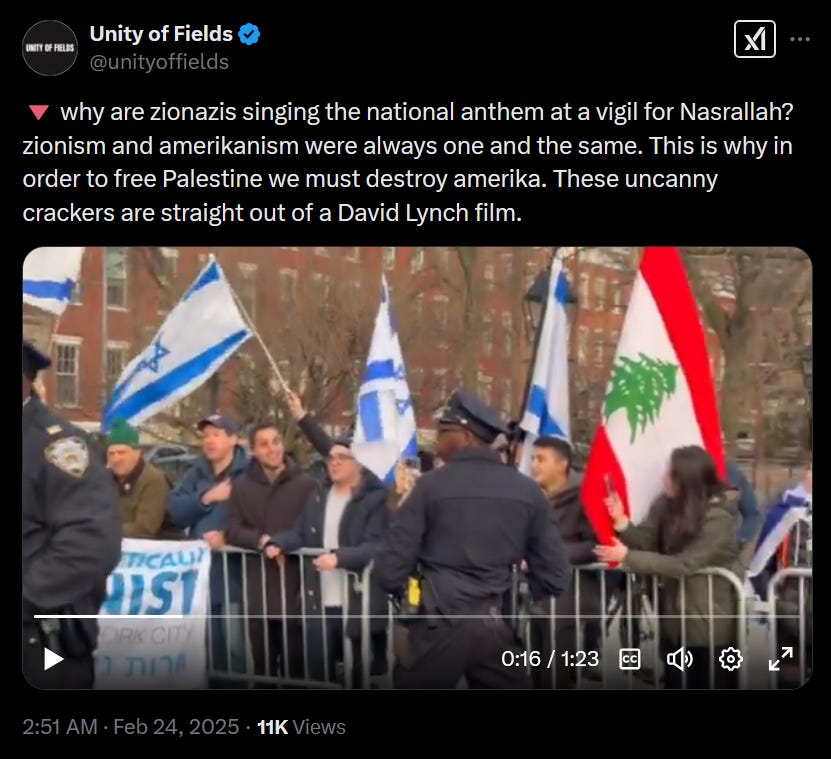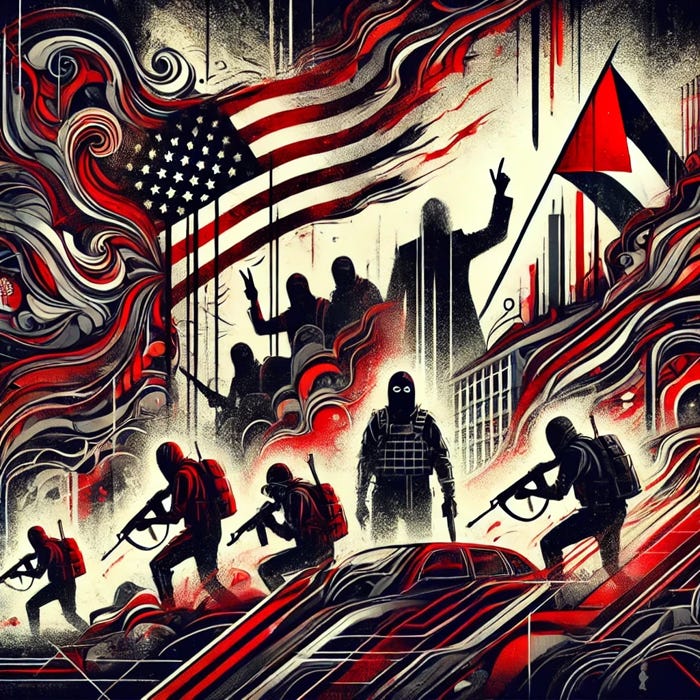Honoring an Arch-Terrorist & Calling to Destroy America: NYC's Nasrallah Vigil Draws Backlash
The Washington Square Park vigil raises alarms about the glorification of extremist figures on U.S. soil who have American blood on their hands.
February 24, 2025 — A controversial vigil held in New York City’s Washington Square Park yesterday has sparked widespread outrage after protestors gathered to honor Hassan Nasrallah, the late leader of Hezbollah—a U.S.-designated terrorist organization with a notorious history of violence, war crimes, and global drug trafficking.
Around 150 demonstrators, many masked and carrying Palestinian flags, convened near the New York University campus to mourn Nasrallah, who was killed in an Israeli airstrike on September 7, 2024. The crowd chanted slogans such as “Long live the intifada,” while others held up posters of Nasrallah alongside Yahya Sinwar, the Hamas leader eliminated by Israel a month later who orchestrated the October 7th massacre in 2023.
The vigil, which was organized under the banner of “anti-imperialism” and “solidarity with the oppressed,” has been condemned by numerous political leaders and community groups as a dangerous glorification of terrorism.

Who Was Hassan Nasrallah?
Under Nasrallah’s leadership, Hezbollah grew from a local Lebanese militia into a powerful regional proxy for Iran, amassing vast military capabilities and solidifying its position as the most formidable non-state actors in the Middle East. Nasrallah orchestrated the 2006 Lebanon War against Israel, resulting in the deaths of over 1,000 Lebanese civilians and hundreds of Israelis. The war also caused massive infrastructural damage and deepened sectarian divides within Lebanon.
One of the earliest and deadliest attacks attributed to Hezbollah was the 1983 bombing of the U.S. Marine barracks in Beirut, which marked a pivotal moment in the group’s violent history. On October 23, 1983, a suicide bomber drove a truck laden with explosives into the U.S. Marine compound, killing 241 American service members and 58 French paratroopers stationed as part of a peacekeeping mission. The attack, orchestrated by Hezbollah with backing from Iran, remains one of the deadliest assaults on U.S. forces overseas.
However, Nasrallah’s role in the Syrian Civil War cemented his legacy as a warlord willing to sacrifice civilian lives for geopolitical gains. Beginning in 2012, Hezbollah sent thousands of fighters into Syria to support Bashar al-Assad’s brutal regime. The group played a significant role in some of the war’s bloodiest battles, including the siege of Aleppo, where indiscriminate bombings and blockades led to the deaths of countless civilians.
Beyond its militant activities, Hezbollah operates a vast global criminal network that includes narcotics trafficking and money laundering. Under Nasrallah’s leadership, the organization collaborated with South American drug cartels, moving cocaine through West Africa into Europe and the United States. A 2016 DEA investigation uncovered a billion-dollar laundering scheme linking Hezbollah to Colombian cartels, with drug profits funding terror operations.
The Role of Activist Organizations
Unity of Fields, the activist organization that promoted the vigil, played a significant role in shaping the event's controversial tone. Known for its radical anti-American rhetoric, Unity of Fields posted numerous posts in the days leading up to and following the vigil, many of which directly criticized the United States. In one post, the organization referred to the U.S. as “the Fourth Reich,” reflecting its deep-rooted hostility toward American foreign policy. In another inflammatory post, Unity of Fields declared that they “must destroy America,” escalating concerns about the radicalization of activist movements.

The Bronx Anti-War Coalition, the organizers of the vigil, often amplifying Unity of Fields' messages, shared similar sentiments, re-posting posts that glorified Hezbollah’s funeral and praised the “Axis of Resistance”—a coalition led by Iran, and includes Assadist Syria, Russia, and North Korea.
As debates over free speech and national security continue, events like the Washington Square Park vigil serve as stark reminders of the challenges faced by democratic societies in confronting the spread of radicalism within their own borders.
The Bigger Picture
The pro-Hezbollah vigil is more than just a flashpoint in the ongoing Israel-Hezbollah conflict—it reflects deeper challenges facing modern democracies: balancing free speech with the need to combat the spread of extremist ideologies.
As Hezbollah continues to exert its influence in Lebanon, Syria, and beyond—both through warfare and global criminal enterprises—the consequences of glorifying figures like Nasrallah extend far beyond a single gathering in New York City.
For many, the vigil served as a stark reminder that the battle against terrorism is not only fought on foreign soil but also in the ideological battlegrounds of cities around the world.



